28 books to build a solid, evolving recovery from addiction
Updated to address neurodivergence, burnout, and cptsd/relational trauma
I first published this list in February 2016 (you can still find it here), with a few casual updates over the years as I’ve read new books that I felt expanded our/my understanding of addiction. The last time I updated it was 2017, and that version lives here on Substack. I think both of these are still excellent resources, especially for early recovery, because they were written from that perspective and while I was living it.
I've been meaning to write an updated list for the past five years to reflect the mind-bending advancements in our understanding of addiction, treatment, drug use, and recovery—Internal Family Systems therapy, harm reduction approaches, drug legalization movements, breakthrough medications like Ozempic, psychedelic medicine, our evolving understanding of trauma, neurodivergence, learning/processing differences and addiction, how hormones impact our use cycles—to name only a few. But I haven't until now, mostly because I've spent the past four years in a process of reconceptualizing my own recovery, reading all these new books I'm about to tell you about. It's only now that I can step back and see how profoundly I've changed through this process—more solidly healed, more grounded in my recovery, more unmasked, more process-over-outcomes focused, healthier and more integrated—and identify which books were essential companions along the way.
This list includes familiar titles that remain as crucial now as when I began healing in 2012. But you'll also discover newer territory: books on neurodivergence, trauma responses, narcissistic abuse, psychedelic therapies, and more.
How to use this resource
This is in no way meant to be a complete list—I’m sure there are significant works I’ve left off, or works vital to you that weren’t to me—which is why I’ve also included a little crowd-sourced section at the bottom (I asked you all for your favorite recovery book, or first book that got you in the door).
I also recommend buying no more than one or two to start; if you’re overwhelmed by the sheer volume of it and just looking to dip your toe in, I recommend starting with one or two of these: Integral Recovery; Internal Family Systems Therapy for Addictions; Quit Like a Woman; This Naked Mind (alcohol specific); 30 Days to a New Relationship with Alcohol; When Things Fall Apart; and Beyond Addiction.
I started with one book—The EasyWay to Control Alcohol—and it went from there. One thing always leads to the next, and just starting anywhere is honestly the only way to go.
Lastly: it was a book that saved my life. Don’t underestimate the power of knowledge or small and subtle perspective shifts.
Please drop your personal favorites in the comments below. I am using an affiliate link system here, primarily through bookshop.org. I only use affiliate marketing for books, and I appreciate the support—a list like this takes years to compile, and I spent a lot of money on books to make it. :)
With so much love, rooting for you from here.
Holly
28 essential books to build a solid, evolving recovery from addiction
I’ve split this up into six sections: Frameworks and Systems (how to conceptualize/map a recovery); Reframing (how to think differently about the substance (or behavior, etc.); Neuroscience; Joy/Hope (ESSENTIAL!); Trauma (or “Clinically burnt-out and/or neurodivergent, potentially peri-menopausal targets of narcissistic abuse who fawn and have histories of addictive processes” (or, “If you know, you know”); and Crowd-Sourced. There is no real memoir in here at all, so please add your favorite. (Reading memoir was an essential part of my recovery; that said, there’s too many good ones to narrow it.)
Frameworks and Systems
How to conceptualize a holistic recovery, and your place in it.
1. Internal Family Systems Therapy for Addictions: Trauma-Informed, Compassion-Based Interventions for Substance Use, Eating, Gambling, and More | year. 2023 | author. Cece Sykes, Martha Sweezy, Richard C. Schwartz
This is one of those “just trust me” books. I started doing parts work (IFS or Internal Family Systems) in 2022 with my therapist, and all I can tell you is that it is healing what I thought would never be healed, and that if I'd found it a decade ago, I would have saved myself a lot of pain and struggle. You can start by reading the very popular No Bad Parts (I recommend listening on Audible; there are helpful guided meditations), but this particular book not only provides an excellent, straightforward overview of addictive processes, but is perhaps the most compassionate and empowering take on addictions I’ve ever read. One of you recommended it to me.
2. Quit Like a Woman: The Radical Choice to Not Drink in a Culture Obsessed with Alcohol | year. 2019 | pages. 352 | author. Holly Whitaker
This is my book, and it’s great. Part memoir, part commentary on why we drink the way we do, part investigation into why recovery frameworks are not designed for over half the population, part how-to, deeply researched, it is one of the best books on alcohol and addiction out there. It has sold around 600,000 copies to date (and is still selling). If you like this newsletter, you’ll probably dig it. Read this to feel empowered and excited about your decision and to understand why some parts of recovery feel harmful to you instead of helpful.
3. Integral Recovery: A Revolutionary Approach to the Treatment of Alcoholism and Addiction | year. 2013 | pages. 312 | author. John Dupuy
While some of what’s in this book might be a little outdated, this is still the gold standard in terms of mapping a recovery. What I said about it before: “If you want to understand exactly how to build a holistic approach to recovery, this is the book you must read. It is by far the most comprehensive modality that is available to us at this time, and is the framework from which my own recovery stands. John Dupuy not only takes the reader through an understanding of how addiction takes root, and why traditional modalities either fail to meet the mark or take us all the way, but provides a complete guide to how to structure an effective and evolutionary approach to recover from addiction and most importantly, thrive in life (for the rest of it).”
4. Beyond Addiction: How Science and Kindness Help People Change (updated edition) | year. 2025 | pages. 384 | author. Foote, Wilkens
This is a book meant for friends and family members of folks in addictive processes, but I’ve found it to be an excellent resource for folks who are experiencing addiction themselves. It’s written by the founders of the Center for Motivation and Change, who are some of the pioneers of harm reduction-based addiction treatment in America, and who are ahead of their time (and have been for decades). This is also an excellent book for folks who are working with an addiction, and the best text that exists for loved ones, who often neglect their self-care and development when dealing with someone in an addictive process. (And remember, even if you’re in recovery, it’s likely you’re going to be a loved one someday, which is a whole other thing you’re gonna need guidance on.)
Reframing your relationship to the substance or behavior (mainly alcohol)
“Books that *could* turn you off your favorite drug”
5. 30 Days to a New Relationship with Alcohol | year. 2025 | pages. N/A | author. Holly Whitaker
This is an audio-only 30-day guide to help you, day by day, move through recovery and/or towards abstinence or just cutting back or just thinking differently about drinking. (Read more about it here, some sample meditations/days are here and here.) It’s based on a 40-day program I used to sell as an email course called “The Mantra Project,” which on its own helped a lot of people quit drinking or change their patterns. (I didn’t promote this book very much, but it’s one of the best things I’ve created, and I get notes almost every day from people letting me know how much it has helped/is helping them, no matter if their goal is to cut back or go full sober.)
6. This Naked Mind: Control Alcohol, Find Freedom, Discover Happiness & Change Your Life | year. 2015 | pages. 272 | author. Annie Grace
What I said about this book before: “I've written extensively about how much the book The Easy Way To Control Alcohol by Allen Carr impacted my recovery (or rather, gave me my recovery). I don't believe I would have had the success I did if I had started anywhere else, and also, I don't think I could have started anywhere else: I wanted to control alcohol, not eliminate it. The book completely flipped the idea of sobriety for me from something that seemed like a consequence and the worst possible scenario to something I 100% wanted (and continue to want). In the same vein as Carr’s work, Annie Grace's Control Alcohol achieves this same end. She carefully takes the reader through the reasons we as a society drink and our social conditioning around alcohol, and makes the same arguments as Carr: that drinking is a monumental waste of time, and recovery from it is akin to freedom, not loss. However, Annie's book has something that Carr's book doesn't: research. It's a well-documented book, written by a woman, and I highly recommend it to anyone who's struggling with sobriety/feeling deprived, as well as to anyone who's just starting out. If you’re feeling extra-credit-y, I encourage you to also read Carr's Easy Way and take the time with the final steps he suggests. When I first attempted sobriety, I wrote Carr’s steps out in my own language and words that made sense to me, and pasted them on the wall above my kitchen sink, and recited them daily. (See below.)
7. The Science of Weed | year. 2024 | pages. 544 | author. Godfrey Pearlson
Earlier this year, I wrote about how I started using cannabis again after years in recovery; I’m currently not using it (this is not a declaration of sobriety, just where I am now and what I’ve decided for myself). A lot of my current disuse has to do with understanding what pot does to your body, especially today’s supercharged strains. I think if I—a human who researches drugs for a living and is the author of multiple books on drugs—was in the dark about the downside of today’s pot, how it impacts your system, or how brutal the withdrawal can be when you stop using it, etc., a lot of us are. This isn’t a book designed to make you not want to use pot, but it’s a book that gives you a lot to consider if you do, and it’s the book primarily responsible for me deciding not to use it regularly and taking a significant break. I also want to mention Mary Giuliani’s book on recovering from CPTSD, and her chapter on using pot in her recovery, and discontinuing it: It's Not About Food, Drugs, or Alcohol: It's About Healing Complex PTSD
Neuroscience
Just the brain stuff.
8. The Biology of Desire: Why Addiction is Not a Disease | year. 2016 | pages. 256 | author. Marc Lewis
This book came out around the same time as Maia Szalavitz's excellent Unbroken Brain, and both were pivotal in my understanding of addiction as learned behavior rather than disease. It is still one of my favorite books on addiction. Lewis, a neuroscientist who has personal experience with addiction, argues that addiction isn't a disease but a developmental learning process—the brain adapts to repeated experiences through neuroplasticity, creating powerful habits that can be unlearned (Here, addiction is not a chronic, relapsing, lifelong condition, but a habit and learned behavior). He traces addiction through the brain's reward system, showing how desire becomes compulsive through reinforcement patterns, not pathology. I've read it three times and revisit it regularly; it still holds up ten years later.
9. Never Enough: The Neuroscience and Experience of Addiction | year. 2019 | pages. 256 | author. Judith Grisel, Ph.D.
Another excellent exploration of how different drugs affect our brain and physiology. Grisel, a behavioral neuroscientist who (like Lewis) has personal experience with addiction, breaks down the science behind tolerance, dependence, and craving across various substances. She explains the opponent-process theory (how the brain's attempt to maintain balance creates the cycle where we need more of a substance to feel normal, let alone good, which I referred to multiple times in Quit Like a Woman (the A/B process)). Grisel covers alcohol, opioids, stimulants, cannabis, and psychedelics, showing how each impacts different neurotransmitter systems while following similar patterns of adaptation and withdrawal. Great for those who want to understand how drugs besides alcohol impact the brain and why addiction feels so inescapable from a neurological perspective.
10. The Molecule of More: How a Single Chemical in Your Brain Drives Love, Sex, and Creativity--and Will Determine the Fate of the Human Race | year. 2018 | pages. 240 | author. xx
Because of bro-culture and biohacking and Hubermanshit, there’s been a growing reaction to “dopamine discourse” and lots of folks out there insisting that dopamine isn’t as important as everyone thinks it is; this is fine and good critique, but saying “dopamine is not everything” can end up sounding a lot like “dopamine is nothing”; which it is not, especially in addiction and especially for those of us with cycling hormones, neurocomplexity, and executive function impairments. This book, in particular, is a kind of sci-pop exploration of dopamine, and one of my favorite books of all time. Great for nerds.
11. Altered Traits: Science Reveals How Meditation Changes Your Mind, Brain, and Body | year. 2018 | pages. 336 | author. xx
The best book I’ve read on how meditation impacts us; it debunks a lot of the bad science out there and overblown claims, and helps the reader truly understand how meditation can affect our well-being, and in what doses. I mention this one in case you’re looking for a balanced take and proper incentive to begin a meditation practice (I cannot sing meditation’s praises enough!). That said, this isn’t a prescriptive/how-to book: if you’re looking for a more practical book on how to start or keep a meditation practice, my favorite books are What is Zen? by Norman Fisher, and Real Kindness by Sharon Salzberg; Insight meditation has been my mainstay, and there are lots of centers and online offerings.
New Category: Neurodivergent potentially peri-menopausal targets of narcissistic abuse who have CPTSD and/or relational trauma, a chronic fawn response, and clinically significant symptoms of burnout with histories of addictive processes (or, “IYKYK!”)
These past five years—since the publication of Quit Like a Woman—have felt less like a continuation of the path I was on in 2020, and more of a second recovery for me, in which I began to understand “What was wrong with me” and my history of addiction in an entirely different light. I was diagnosed with ADHD and finally learned what it meant to be neurodivergent, and how it manifested in me in particular; entered perimenopause and a period of massive hormonal-related issues; realized I wasn't an Enneagram four but a deeply-wounded people-pleaser prone to emotional dysregulation; finally researched narcissistic abuse and realized I was a classic “target” and that entire books existed to explain my relational patterns; learned what relational trauma is!; moved out of the role of family scapegoat and “identified patient”; tried pscyhedelics and returned to using cannabis; realized I was in a near-constant state of nervous system dysregulation and thus living in a near-constant fawn response; and got burned out on recovery and fixing and healing and the constant self-analysis it required.
It’s not so much that I experienced all these things, but that over time it became highly apparent that each of these individual things was deeply interrelated.
One study I found showed that up to 42% of folks in treatment for addictive processes have undiagnosed and untreated ADHD; ADHD causes—especially in women—emotional dysregulation, self-surveillance, a deep need to mask and perform, and results in a lot of fawn-like behavior; a fawn response is related to a history of trauma, but also related to being a target of narcissistic abuse, but also related to family systems, but also related to what you do when you are always late and everyone thinks you’re a piece of shit but it’s your invisible disability that most people don’t even think is a real thing; nervous system regulation is needed to keep you out of a fawn response, but it’s also how you manage your ADHD, your tendency to people please, your inability to erect and keep boundaries, and whether or not you’ll experience a massive relapse; clinical burnout looks a lot like ADHD and autism; and clinical burnout, ADHD, autism, etc. are all conditions that impact executive function and the PFC; the PFC is deeply tied to addiction; I could go on.
You will not find any of what I just said in the recovery canon. You will rarely even find a book (again, in the recovery canon) that admits that your cycle can cause a relapse, that ADHD leads to self-medication, or mentions the fawn response. Below are the books that helped me make more sense of myself, and a lot of what’s below is where my work is heading—if this piques your interest, or you feel seen in what I just wrote, please leave a comment.
The basic premise is: it’s all related to trauma and nervous system regulation. Focus on those two things first.
12. The Body Keeps The Score | year. 2014. | pages. 464 | author. Bessel van der Kolk.
I am still keeping this one even though there are cracks in the facade, since it tracks with my own experience that somatic-oriented body-based work has been the most effective for me in healing my trauma (specifically Somatic Experiencing).
13. Are you Mad at Me? How to Stop Focusing on What Others Think and Start Living for You | year. 2025. | pages. 304 | author. Meg Josephson
Of all the books I’ve listed, this one impacted me the most. If you’re someone who finds yourself wondering all the time if you’ve done something wrong or people are mad at you, or if you find yourself constantly over-explaining, over-apologizing, over-compensating, or if your first instinct when you’re threatened is to appease and please, or if you feel like you’re too much or too little…this book is going to be a game changer. Meg writes with deep clarity and compassion about the internal narratives and attachment wounds that keep us stuck in people-pleasing, over-apologizing, and spiraling in shame, and never feeling like adults. It’s also a perfect companion to No Bad Parts and It’s Not You (below).
14. Unmasking Autism | year. 2022 | pages. 304 | author. Dr. Devon Price
This book reoriented how I understood masking, burnout, sensory overwhelm, and why I still felt so broken even after all my years in recovery. Written by a self-identified autistic social psychologist, Unmasking Autism looks at how people—especially women, AFAB folks, and people of color—develop finely-tuned social camouflage that keeps them safe but profoundly disconnected. If you suspect you might be neurodivergent, or just deeply exhausted by performing normalcy, this one’s for you. One of the best explanations I’ve read of why addiction is sometimes the only way to cope in a world not built for your brain and why so many of my behaviors make complete and total sense.
15. Your Brain’s Not Broken: Strategies for Navigating Your Emotions and Life with ADHD | year. 2022 | pages. 208 | author. Tamara Rosier
While I pretty much “knew” I had ADHD before I was diagnosed (and even though my mother was a reading specialist who worked with kids with ADHD and learning differences, and wrote her dissertation on that…) I didn’t know anything about ADHD or what it meant to have it. It wasn’t until a dinner with a friend in Los Angeles in 2022 that I took it seriously. When I waved away her diagnosis and said something like “everyone has it, including me”, she said Absolutely not, and then told me about how much her life had improved since getting her diagnosis. She said it made everything easier and her life make sense. Still, I was so burned out from years of fixing and healing that I couldn’t bring myself to learn about ONE MORE FUCKING THING WRONG WITH ME, and so I didn’t dig in for a while. When I eventually decided to start learning, this was the first book I read, and it remains (to me) the most vital in the canon, in part because it’s such an easy and short read and has a workbook, and has practical exercises that were not hard to implement. Tamara makes it easy to understand (I listened to the audiobook) and also helped me to see my ADHD as a superpower instead of a disability or deficiency. Others that I love: Nowhere Girl (I just finished this, and it named SO MANY similar experiences—a real treat); How To ADHD.
16. It’s Not You: Identifying and Healing from Narcissistic People | year. 2024 | pages. 304 | author. Ramani Durvasula, Ph.D.
Because of all these intersecting factors—my sensitivity, my cyclical nature, my family dynamics, my undiagnosed neurodivergence, my relational trauma and fawn response, my history as both scapegoat and "identified patient," my addiction patterns, my deeply ingrained belief that everything is always my fault—I've come to understand myself as a classic target of narcissistic abuse. This book names what recovery spaces often mislabel as codependency, "bad boundaries," or "self-sabotage," reframing these behaviors as predictable responses to specific relational conditioning. Dr. Ramani writes with clinical precision but profound compassion for those of us who've spent years wondering why we attract the same painful dynamics, why we're perpetually "too sensitive" or "too much," and why traditional recovery advice about boundaries never quite sticks. This isn't about demonizing anyone—it's about understanding how certain personality types exploit trauma histories, neurodivergent traits, and people-pleasing patterns to create predictable cycles of harm. Essential if you've ever felt like the common denominator in every relationship disaster, or if you find yourself constantly apologizing for taking up space.
17. These two podcasts on hormones | I have yet to find a book that covers hormones and their impact on addiction, so I’m including two podcasts: one on HRT (“Women’s sexual health, menopause, and hormone replacement therapy (HRT)” The Drive with Peter Attia—blessings to Cheryl Strayed for recommending); “How Hormones Impact Drinking, Addiction, and Recovery” Recovering newsletter. The gist is cyclical and perimenopausal fluctuations put us at risk for relapse, make quitting and sustaining harder, and worsen ADHD symptoms; HRT or birth control can help manage these things.
18. The Dark Side of the Light Chasers | year. 2010 | pages. 208 | author. Debbie Ford
One of the most important types of work I did in recovery was something called shadow work, which simply put is the practice of recognizing and integrating the parts of ourselves we've rejected, denied, or hidden away because we deemed them unacceptable or shameful. I found my way to it in 2014, when after a year of sobriety I encountered my first real period of depression, and internalized it as something gone wrong in my recovery. I was in my second yoga teacher training and struggling mightily—I judged most people I was training with, dreaded going to it most days, and in general felt like a misanthropic bitch who would never find happiness or peace, and all of it felt like evidence I wasn’t as healed as I should be. It was during this that a friend who I was complaining to about a guy who didn’t like me in my training asked me if I liked him. When I thought about it and said no, I did not, she laughed and said it sounded like it was less about him and more about me, and handed me The Dark Side of the Light Chasers, which introduced me to a kind of acceptance of myself I didn’t think was possible. A decade later, there’s been a lot of new work in this field, notably Internal Family Systems, and while IFS is the gold standard, it’s still TDSOTLC that I credit with having the most impact. Whether or not you’ve done parts work, I think this little book is one of the best out there on integrating the shadow (bonus: it was written by a woman).
Joy, Hope, Gratitude
This should probably be at the top. If you’re trying to break an addiction, you’re gonna need to find joy, try and have fun, look for the levity, and imagine a future you’ve never been able to. Addiction often robs us of our ability to see a future and experience joy, love, expansion, and hope (there’s so many factors for this, including anhedonia and hijacking of the dopaminergic system, but I love Marc Lewis’ explanation of a reciprocal narrowing that takes place, where everything shrinks so we can only see the addiction). The point is: we need to invest in raising our vibration, widening what we think is possible, and actively imagine our futures—whether that’s through adopting a meditation practice, going to church, being part of any type of healing or mutual aid community, or direct practices meant to fulfill this end. For me, it was everything I just wrote, plus a lot of affirmation-repeating, praying, gratitude list making, taking pictures of the clouds, traveling, and reading books that gave me practices and hope. Here are some of my favorites.
19. Make Miracles in Forty Days: Turning What You Have Into What You Want | year. 2011 | pages. 192 | author. Melody Beattie
The best book on gratitude, ever. I wrote about it here but the practice is relatively simple: each day you write down a list of things your grateful for, including the things that you’re probably not grateful for (because sometimes the worst things lead to the best things, and sometimes the best things lead to the worst things—we are practicing being grateful even for what hurts in the moment.) I also loved May Cause Miracles by Gabby Bernstein (this was a pivotal program for me), and my 30 Day guide also serves a similar purpose (these latter two are more affirmation-based and about re-patterning thoughts).
20. When Things Fall Apart | year. 2018 | pages. 336 | author. Pema Chödrön
The best book ever, period. A lot of people struggle with it and find it too dense, so I also recommend her talks, specifically The Three Commitments. Something like Eckhart Tolle’s A New Earth is also great, as is The Great Work of Your Life (this one especially if you feel like you’ve wasted so much time with addiction).
21. The Creative Act | year. 2023 | pages. 432 | author. Rick Rubin
I started writing a few weeks after I stopped drinking for good, and I credit that and many other creative outlets I explored (including travel) with saving my life and giving me a very different purpose. The Gospel of Thomas quotes Jesus as having said “If you bring forth what is within you, what you bring forth will save you. If you do not bring forth what is within you, what you do not bring forth will destroy you.” And I have found this to be true. This book is an incredible meditation on creation and I found it to be beyond inspiring. I also recommend The Artist’s Way.
Cultural/Social
There are a number of books that examine the cultural context of addiction, the war on drugs, and systemic and systematic issues that shape both addiction and recovery experiences. Understanding these broader forces is crucial because addiction doesn't happen in a vacuum - it's deeply influenced by policy, stigma, social structures, and cultural narratives that often blame individuals for what are largely societal failures. These books help us see how criminalization, poverty, trauma, and disconnection create the very conditions that fuel addictive behaviors, while also revealing how different approaches - from harm reduction to decriminalization - can dramatically improve outcomes. Rather than focusing solely on individual pathology or personal responsibility, these works illuminate how changing systems and policies can be just as important as changing ourselves.
(#22 through #28): Because this list is already very long, I’m including my favorites, without summaries: The Urge for understanding the history of addiction (see here, here, and here for my interviews with Carl Erik Fisher); How To Change Your Mind for understanding the history and potential of psychedelics; Chasing the Scream for cursory exploration of the war on drugs; Undoing Drugs for the history and impact of the harm reduction movement; Slaying the Dragon for a complete (and I mean complete—it’s a text book) history of recovery; Psychonauts for the history of drug use (a favorite!); Many Roads, One Journey for the patriarchal influence on addiction, drug taking, and recovery; and The Globalization of Addiction for the impact of capitalism/free market systems on addiction and recovery.
Crowdsourced! (Your recommendations)
I asked you all for your favorite recovery book, or first book that got you in the door, and here’s what you said (* are my picks too, that I’ve read and loved and recommend)
*Push off From Here This was hard to leave out of my list—a truly excellent book I love and return to that belongs in Frameworks and Systems
*Stash The only book on this entire page written by a Black woman (or any POC—this is a super white list because there are so few books on the subject matter by non-white voices. Other great addiction books by non-white authors: Eight Step Recovery; My Grandmother’s Hands; Drug Use for Grown Ups)
*The Biology of Belief
*In the realm of hungry ghosts
*The Way of Integrity
*Alcohol Explained
*Bird by Bird
*Drink?
*The Power of Intention
A Hidden Wholeness
The Nature of Consciousness
*Dry
*The Unexpected Joy of Being Sober
Pretty Wicked
The Outrun
Happy Hours
*Nothing Good Can Come from This
*Dry Humping
My Fair Junkie
*Lit
You Can Heal Your Life
Radical Remission: Surviving Cancer Against All Odds
*The Artist’s Way
Dopamine Nation
Already Free: Buddhism Meets Psychotherapy
Happy Hours: Alcohol in a Woman’s Life
A Hidden Wholeness
In the Realm of Hungry Ghosts
*We Are The Luckiest
The Nature of Consciousness
Pretty Wrecked
Radical Compassion
Did I miss anything? Add yours here!
Almost all of these books were recommended to me at some point—I love a good recommendation, if I missed anything add it in the comments.



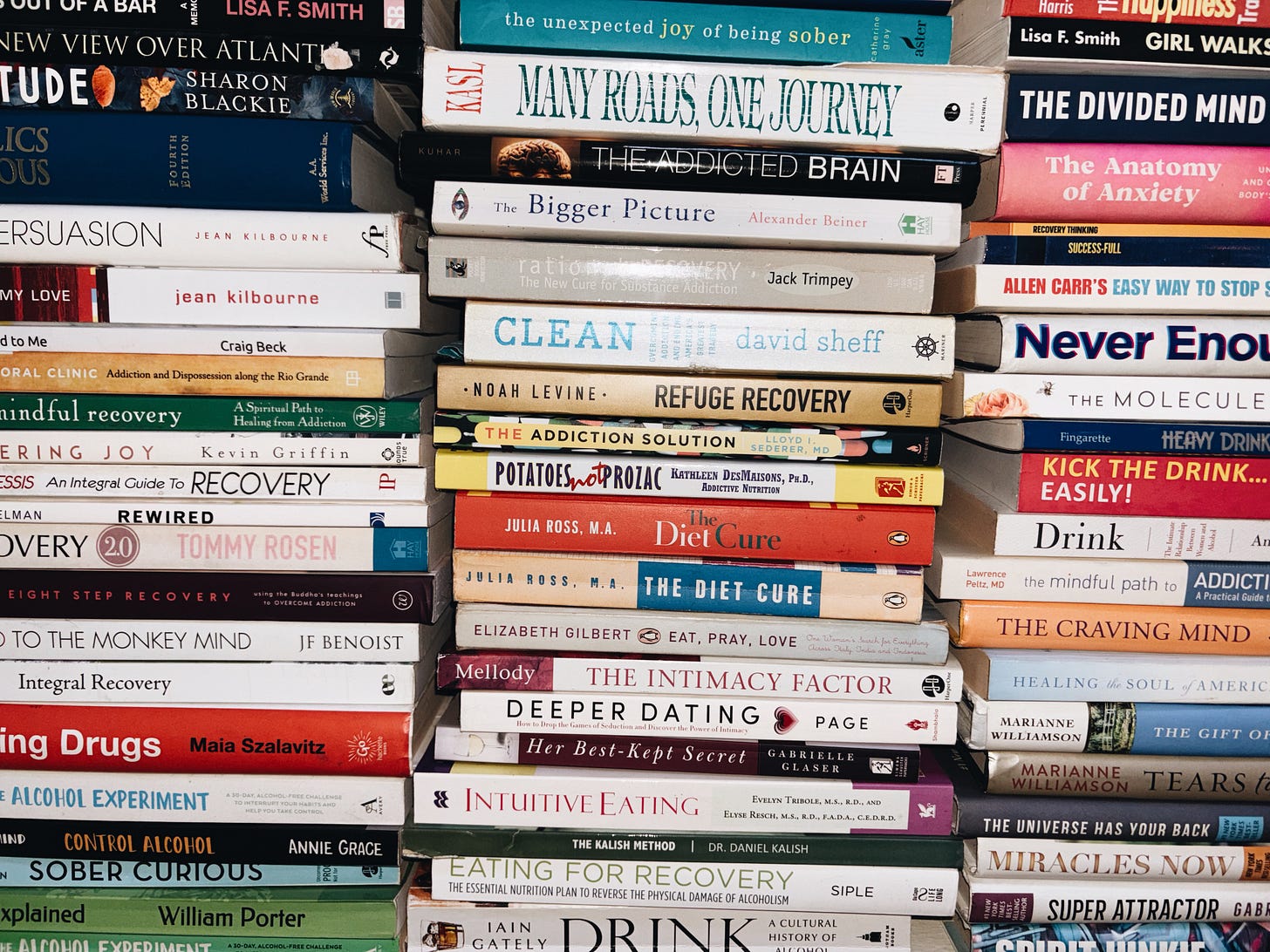
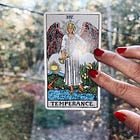
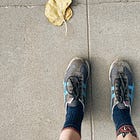
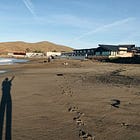
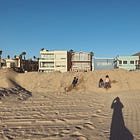
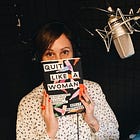
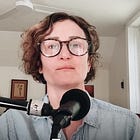

An incredible memoir by a black woman is: A Piece of Cake by Cupcake Brown.
Another book from Cather Gray (in addition to the TUJOBS) is Sunshine Warm Sober: The Unexpected Joy of being Sober - Forever.
I loved these too:
This Ragged Grace by Octavia Bright
Pour Me, A.A. Gills memoir
Sober on a Drunk Planet, Sean Alexander (series)
A Woman’s Way Through the 12 Steps, Stephanie Covington
The Language Of Letting Go Journal (Hazelden Meditations): A Meditation Book and Journal for Daily Reflection, Melodie Beattie
White Hot Truth: Clarity for Keeping It Real on Your Spiritual Path from One Seeker to Another by Danielle LaPorte
The Way of Integrity: Finding the path to your true self by Martha Beck
Holly, thank you so much for all of this, but especially for the new section. I see myself reflected in your words with a clarity that throws into sharp relief the essence of what my recovery is about. I’m in the late stages of peri and just got an ADHD diagnosis at the age of 53. It doesn’t feel like a superpower right now, it feels like I’m grieving for the missing pieces of myself, all that lost potential. But I also have a clearer starting point to find the path back to myself. Looking forward to the direction of where your new work is heading. With gratitude, Kim